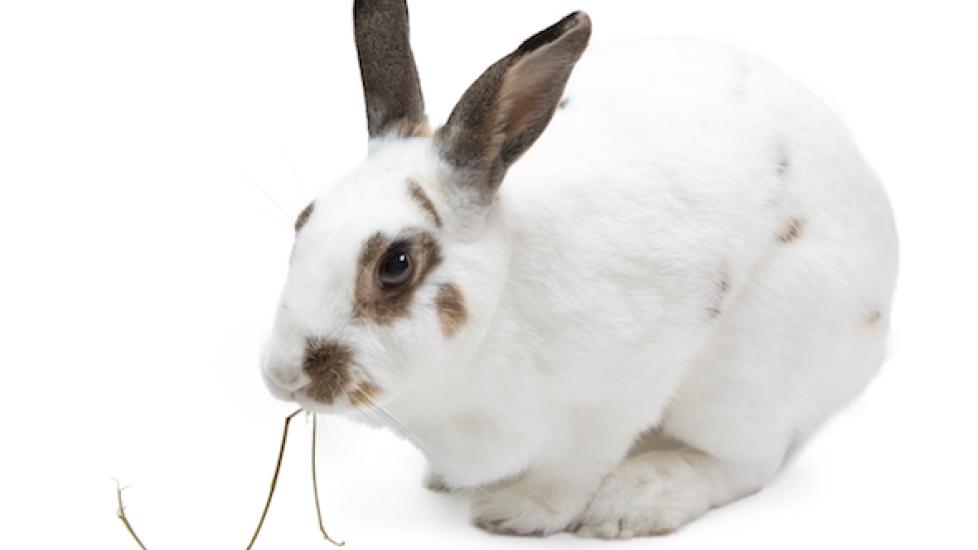What Do You Feed a Rabbit?
By Helen-Anne Travis
What do you feed a rabbit? The answer is simple. Rabbits thrive on high-fiber diets rich in grass hays including timothy, brome and orchardgrass hay. Those new to rabbit ownership may think the big bags of pellets for sale at the local pet store are all a rabbit should eat. Instead, the pellets are more like a rabbit multivitamin, providing supplemental minerals, protein and fiber.
“Pellets are far too rich to make up the bulk of [a rabbit’s] diet,” said Dr. Peter Helmer, a specialist in small mammals at BluePearl Veterinary Partners in Clearwater, FL. “Rabbits have evolved eating grasses and roots; there are no pellet dispensers in the wild.”
You can also feed your pet rabbit fresh vegetables, but not the carrots we associate with Bugs Bunny. Carrots have more sugar than adult rabbits’ digestive tracts prefer. Small amounts are fine as treats, Helmer said, but dark leafy greens are preferred. Broccoli leaves and stems and dark leaf lettuces make more suitable rabbit snacks.
What to Feed a Baby Rabbit Versus an Adult Rabbit
For the first seven weeks of life, a baby rabbit’s diet should consist of mostly its mother’s milk, according to the House Rabbit Society, a nonprofit organization dedicated to rescuing abandoned rabbits and educating the public on rabbit care. At three weeks, alfalfa hay and pellets can be slowly introduced, giving them free range to both at seven weeks. During this period you can also give your pet small tastes of romaine lettuce and carrots, but should avoid the dark leafy greens until your rabbit is a bit older.
While baby rabbits (which are called kits) thrive on the protein and calcium-rich alfalfa hays, adult rabbits need something a bit more substantial. “It’s like feeding a dog puppy food,” Helmer said. Alfalfa hay is higher in calcium and protein than grass hay, which is ideal for growing rabbits but too rich for adults. If you are feeding alfalfa it's a good idea to feed it mixed with grass hay. This stops your rabbits getting so hooked on alfalfa that it's difficult to make the transition to grass hay when they reach adulthood. You should phase out alfalfa at around four to five months old.
Around six months, slowly start swapping out alfalfa in favor of grass hays and ease up on the pellets. Adult rabbits should eat around 1/4 cup of pellets per day for every five pounds of weight they have, according to Helmer.
By the end of its first year, your rabbit’s daily diet should consist of unlimited grass hays, a small portion of pellets and two to four cups of at least three different fresh vegetables for every six pounds of weight. Wash and chop all vegetables thoroughly and serve them moist to help aid digestion. Always introduce new foods slowly, and remember to keep your rabbit’s water dish clean and filled with fresh water.
What Not to Feed Rabbits
The most problematic foods for rabbits, according to Helmer, include foods that have a high amount of sugar and foods that have a high amount of carbohydrates, as these items throw off the balance of the bacteria in their gastrointestinal tracts. High-carb foods, like breads, crackers and cereals can cause diarrhea, while fruits, which we normally think of as healthful, often contain more sugar than a rabbit’s stomach can handle.
The House Rabbit Society recommends feeding healthy, non-dieting adult rabbits no more than two tablespoons of high-fiber fruits (think apples, blueberries and plums) per day for every five pounds of body weight. Wash everything thoroughly and be sure to remove any pits and seeds. Too much fruit will not only overwhelm their stomachs, but can cause them to turn up their noses to the more healthful grass hays and dark leafy greens that should make up the bulk of their diet.
Where To Buy Rabbit Food
Fortunately, you don’t have to go to a farm to get your rabbit hay, as it is sold both in pet stores and online. When shopping for hay, there isn’t much that separates one brand from another, Helmer said, but make sure the package isn’t moldy or foul smelling. For pellets, the House Rabbit Society advises you look for brands that contain at least 18 percent fiber. It’s also not advised to buy more rabbit feed than you need, as six weeks or more worth of your rabbit’s food can easily spoil.
Image: MaxShutter / Shutterstock
